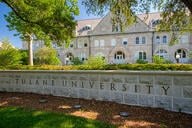You have /5 articles left.
Sign up for a free account or log in.
WASHINGTON – Where does history, seen by some as a social science and others as a humanities discipline, fit into general education? A workshop on undergraduate teaching focused on that question Thursday at the annual meeting of the American Historical Association, with faculty panelists – including those involved in the Lumina Foundation’s Tuning project to identify what students in a given discipline should know and be able to do upon completion of their degrees – sharing mixed feelings about the push for more standardized curriculums.
Marianne Wokeck, professor of history and associate dean of academic affairs at Indiana University-Purdue University at Indianapolis, said there was much to like about initiatives that ask faculty to re-examine what they teach and to what end. For that reason, she said she’d been involved in the Tuning project in history, in which AHA has played a key role through a grant from Lumina, since the program's earliest days. But she said a recent mandate by the Indiana state legislature to adopt a 30-credit, fully transferable core curriculum within a year is a case study in what happens when those reexaminations happen too soon, from the top down.
“I’m really here to be a bit of a negativist,” Wokeck said, describing the rapid general education design process as a kind of turf war that was “certainly not bloodless” among disciplines arguing that their courses were vital. In the end, she said, “We did it.” But given the time constraints and the fact few resources were devoted to ensuring real transferability of knowledge and skills among institutions, “We did it badly.”
Wokeck partly blamed Lumina, which is based in Indianapolis and aims to increase the percentage of Americans with college degrees or certifications to 60 percent by 2025, for the botched process. “The completion agenda is driving what is happening at public institutions in Indiana,” she said. She advised institutions contemplating core curriculums to allow for lots of communication among faculty members, deans and their provosts, and real means of assessing transferability. Otherwise, core curriculums become a “smorgasbord,” rather than the cohesive introduction to higher education they’re intended to be, she said.
In an emailed statement, Juan Kiko Suarez, a Lumina spokesman said: “We applaud the focus of the Indiana Commission of Higher Education in cooperation with Indiana higher education institutions to find ways to enable more underserved populations access and complete post-secondary education."
can we add response from Lumina? -sj****Havent' heard back from call or email.... Will add if I get tomorrow??? ----CFDaniel McInerney, a professor of history at Utah State University, also expressed some frustration at the “alphabet soup” of reform movements, including Tuning, on his campus, but said his department had devised a way to ensure content remained meaningful. Called a “pre-major,” it’s a course of work that allows students to develop some grounding in history before they can elect to major in it. That way, he said, students are building skills and competency in upper-level courses, “not just adding credits to a score card.”
Instead of thinking about “GE” as general education, he added, it may be more meaningful to call it “gateway education.”
Other institutions, including Southern New Hampshire University on its traditional campus, have taken different routes. In an attempt to make sure history is well-represented among its new core curriculum offerings (there is no history requirement), the history department has removed prerequisites from all of its courses, except methodology. It’s a somewhat risky move, said Kenneth Nivison, associate professor of history, with the new policy’s effects on enrollment unclear, and the question remaining of whether students without a foundational grounding in history will succeed in upper-level courses.
The department’s challenge, he said, is to think about history is “new, different and impactful ways” to attract students. Instead of being defensive about the core curriculum debate, he added, “you say, maybe this is an opportunity for history to have a greater role in gen ed.”
Panelists with similar views talked repackaging history courses in creative ways to attract students who may not automatically be drawn to the discipline, such as creating paired courses with a history class and on a class on a similar topic in another field.
One professor also said Tuning on his campus helped him better understand the needs of his students and their future employers. David J. Trowbridge, a professor of history at Marshall University said he didn't want to "go through the motions [of Tuning] because we are accountable." But in his West Virginia town, he said, accountability usually means one thing for his students: jobs.
"I teach at a university between the Ohio River and a steel mill, so when I think about accountability, I have to take that into account," he said. Consequently, he and James Grossman, executive director of the AHA, have met with business leaders in the areas surrounding Marshall to talk to them about what they look for in recent graduates. It made him think about what he was doing and wasn't doing to prepare students, he said. Oral history, for example, prepares students for careers in sales. Group work is another important preparation for a career in business.
But several professors also cited concerns about assessing students under a common curriculum, where students with various disciplinary backgrounds may be in the same course and evaluated based on learning goals outlined in other rubrics and by other more qualitative than quantitative measures. One solution presented by Gladys Frantz-Murphy, professor of history at Regis University in Colorado, is portfolio-based assessment. Short "learning experiences" through which students must verbally and in writing demonstrate their growing mastery of historical thinking account for 25 percent of their grades.
Knowing how to ask a good question is better than being able to answer it, she said. "I tell them that all the time."
Sara Haviland, an assistant professor of history at St. Francis College in New York, who attended the session, said she appreciated the “tensions” surrounding core curriculums. Her college is currently designing a general education program, and it will probably be a good fit for the students there, she said. But it’s not necessarily right for all campuses, and too much outside pressure to introduce one too soon could diminish the faculty role in the process. (Note: This paragraph has been updated from an earlier version, which misstated the location of St. Francis College.)





